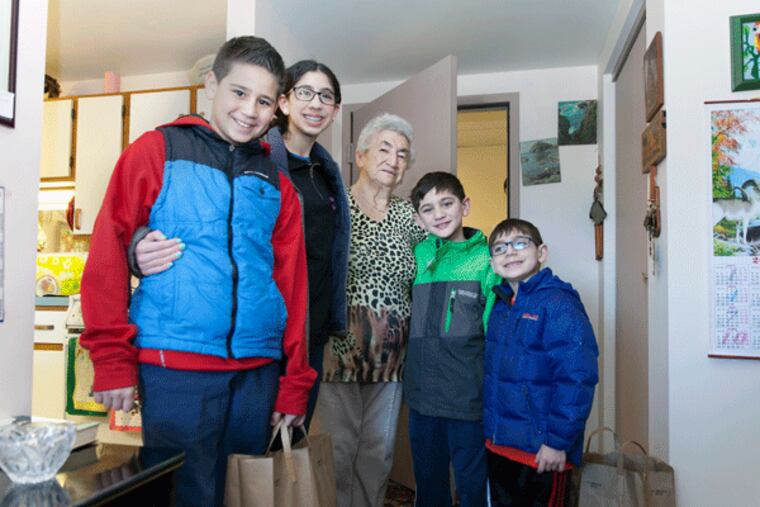Kosher food for Passover delivered to needy families
Joan Pavalow had planned a trip to the supermarket this week - with Passover just a few days away, she needed groceries. But then she decided not to go.

Joan Pavalow had planned a trip to the supermarket this week - with Passover just a few days away, she needed groceries. But then she decided not to go.
She just didn't have the money, she said.
So on Sunday afternoon, when the Kepniss family - David and Marla and their four kids - showed up at her apartment with two bags full of kosher-for-Passover food, Pavalow reacted with gratitude - and relief.
"This is a life-saver to me," she said. "I don't have the money to go to Shop Rite - and this is wonderful."
Pavalow was one of hundreds of people in the Philadelphia region who had food delivered to their doors Sunday in anticipation of Passover, which begins at sundown on Friday. The program, run by the Jewish service organization B'Nai Brith and known as Project HOPE, has been serving needy Jewish families in four states and the District of Columbia since the 1960s.
Philadelphia's Project HOPE program was begun 18 years ago by Dresher resident Samuel Domsky, who for several years ran the entire operation out of his garage with donated food. Now, he raises $30,000 a year to buy Passover staples such as matzo, eggs, and gefilte fish, and has gone from serving 75 families a year to 600.
"There's a general lack of knowledge of the extent of poverty in the Jewish community," Domsky said. "We helped raise awareness that there are many out there - seniors, Holocaust survivors, people just hanging on."
According to statistics from the Philadelphia Corporation for the Aging, 7 percent of Jewish people in the five-county Philadelphia region between 18 and 39 - and 6 percent of those age 75 and older - were living at the poverty level in 2012.
On Sunday, about 400 volunteers - the Kepniss family among them - gathered at Temple Sinai in Dresher to pack grocery bags full of food, load them into cars, and drive them to homes and apartments across the city.
The Kepniss family, of Philadelphia, was sent with more than a dozen bags to the Robert Saligman House, a Jewish retirement home on Roosevelt Boulevard. David and Marla Kepniss and their children - Talia, 13; Emmett, 11; Max, 8; and Joel, 6 - spent about an hour making deliveries in the narrow hallways.
For their trouble, they received hugs, smiles, and the occasional piece of candy for the children.
Some residents welcomed the conversation, too. Barry Nodler, on the seventh floor, regaled the group with memories of bygone days - such as a horse and wagon arriving at his childhood home with blocks of ice for the icebox. On the eighth floor, a language barrier didn't keep an elderly Russian woman from showing off her family photos and pressing candies into the children's hands (and a reporter's coat pocket).
At her apartment door, Pavalow told stories about her father-in-law, a cantor at a synagogue who always made sure the prayers were read perfectly at their Passover seders.
Those who receive Project HOPE food are recommended by social service agencies - the Klein Jewish Community Center and the Jewish Family and Children's Service, and include many senior citizens, Domsky said. The project teams with George's Dreshertown Shop N'Bag, which buys the groceries in bulk at discount.
Volunteers say they benefit from the program as much as its recipients do.
"It's the contact with such a broad range of people," said Peter Adlowitz, of Philadelphia's P'nai Or congregation. "The giving, to me, doesn't feel like it's one way."
The Kepnisses have been delivering Passover goods for about seven years. It's occasionally tough getting the kids out of bed early on a Sunday morning, David Kepniss said, but the rewards are worth it.
"Letting the kids witness the impact this has on families - these are real people, local people - is very meaningful as a parent," he said.
As the family gathered in the apartment building lobby after a full morning, Max said he felt "tired and good at the same time."
"It makes me feel grateful," said his sister Talia, "for what I have."